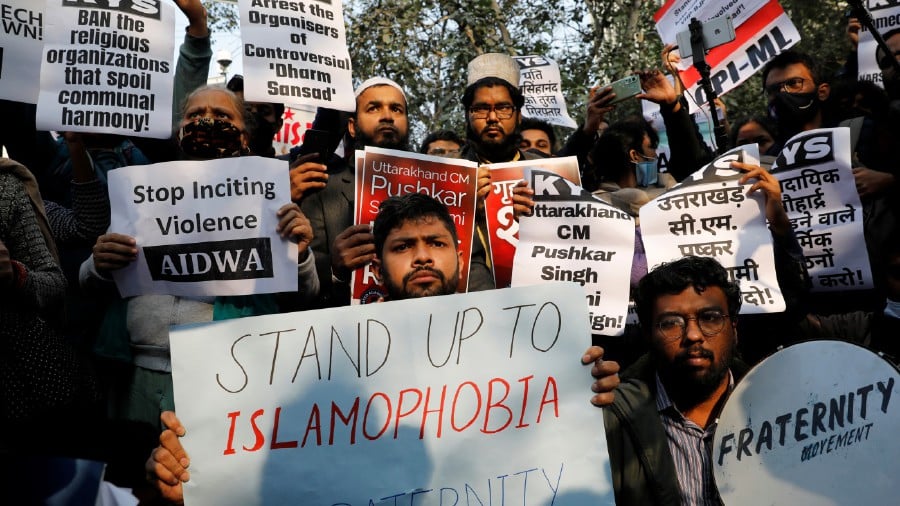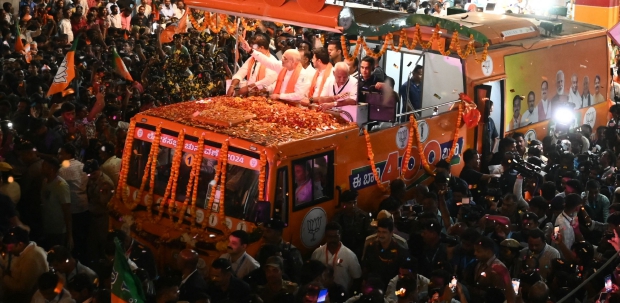Hours after Hamas attacked southern Israel on Oct 7, a WhatsApp message purporting to list the names of 17 Indian Hindus killed or wounded in the assault went viral in India, drawing horrified reactions.
But, the list was fake — none were hurt.
In the following weeks, hundreds of messages referencing the conflict between Israel and the Palestinian group spread rapidly on Indian social media accounts, said fact-checkers and researchers documenting online disinformation about India's Muslim minority.
Many of those messages warned Hindus that their safety could be at risk from Muslims if the Hindu nationalist Bharatiya Janata Party (BJP) loses power in next year's election.
"Every local and global incident is used to convey the message that Muslims are evil, that Hindus need to be afraid," said Bharat Nayak, an independent fact-checker in the east Indian state of Jharkhand.
"When there isn't a current incident, past incidents are recycled with doctored images and videos, to say: if Hindus are to stay safe, vote for BJP," Nayak, who tracks disinformation and hate speech on viral WhatsApp messages, told the Thomson Reuters Foundation.
Islamophobic and antisemitic hate speech have surged worldwide since Oct 7, with millions of abusive posts on Facebook,
In India, Muslims make up about 14 per cent of the nation's 1.4 billion Hindu-majority population.
With a general election due by May 2024, and several state elections this month, disinformation and hate speech targeting them are on the rise.
"Conflicts, elections will always spawn these kinds of narratives (and) the nature of this conflict is an opportunity to grind a Hindu versus Muslim axe," said Marc Owen Jones, an associate professor at Hamad bin Khalifa University in Qatar.
Asked to comment, Tom Vadakkan, a national spokesperson for the BJP, said: "The BJP and the government do not encourage any hate speech against any community or person."
During the BJP's rule over the past decade, party members and allies have been accused by human rights groups of inflammatory speech against Muslims that incites violence on the ground.
Hashtags including #coronajihad and #lovejihad have gone viral in recent years, and been used to falsely accuse Muslims of deliberately spreading the coronavirus and forcefully converting and marrying Hindu women.
Deadly clashes have broken out over false rumours on WhatsApp and Facebook of Muslim gangs kidnapping children.
The BJP, which is widely forecast to win a third term in 2024, has launched a national campaign to woo Muslim voters.
A senior Muslim party leader told Reuters this month that Hindu-Muslim violence only makes headlines now because political rivals use it to target the party.
Elections often lead to an increase in anti-Muslim hate speech, researchers have found, with such incidents averaging more than one a day in the first half of 2023, mostly in states with upcoming elections.
Fact-checking organisation BOOM Live showed there was a surge in misinformation before polls in southern Karnataka state in May, which the opposition Congress party went on to win.
"Disinformation targeting Muslims has become more vitriolic and aggressive, with most of the false claims reinforcing negative stereotypes," said Karen Rebelo, deputy editor at Boom.
Meta Platforms, owner of Facebook and Instagram, has said it has added more fact-checkers in India, "making it the country with the most third-party fact-checking partners globally across Meta".
With its young population, India is among the biggest markets for social media platforms, with more than 300 million users on Facebook, and about 500 million each on YouTube and on WhatsApp.
Social media firms have frequently clashed with Indian authorities over content moderation.
Meta received nearly 64,000 content removal requests from the Indian government in the second half of 2022, its data show, more than a quarter of all requests.
Google's YouTube removed more than two million videos in India in April-June of this year, more than in any other country.
After Facebook whistleblower Frances Haugen leaked internal documents in 2019 showing the platform's struggles monitoring hate speech in countries including India, Meta agreed to conduct an independent human rights impact assessment.
Meta has not released the full report, despite calls from human rights groups to do so.
The writer is from Reuters





